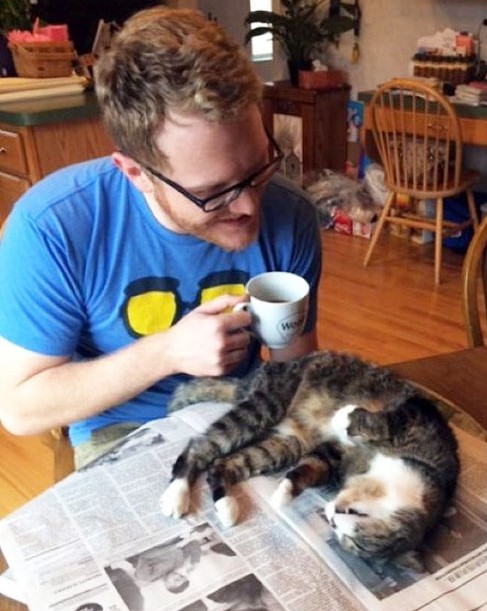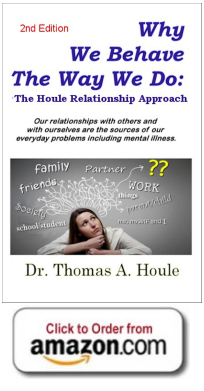 I had a cat. His name was Gatto. Gatto was gifted with an ability to control me whenever he chose to do so. For example, when I sat down to read the paper he would start by looking up at me, insisting that I pick him up, set him in my lap and pet him. If I didn’t do what he wanted he would paw at the paper, pull against my pants or rub against my leg. He would do anything to make me pay attention to him.Once he even plopped himself on the paper I was reading and looked up at me as if to say, “Now you can’t ignore me.” After Gatto had successfully commanded my attention, he would leave, satisfied that he has gained what he was after.
I had a cat. His name was Gatto. Gatto was gifted with an ability to control me whenever he chose to do so. For example, when I sat down to read the paper he would start by looking up at me, insisting that I pick him up, set him in my lap and pet him. If I didn’t do what he wanted he would paw at the paper, pull against my pants or rub against my leg. He would do anything to make me pay attention to him.Once he even plopped himself on the paper I was reading and looked up at me as if to say, “Now you can’t ignore me.” After Gatto had successfully commanded my attention, he would leave, satisfied that he has gained what he was after.
People are like Gatto. They also want attention. And they will go to great ends to get it. But why attention? What is it about attention that is so compelling that most, if not all, humans go desperately in search of it?
Perhaps a definition is a good place to start answering that question.
The meaning of the word attention I will use here is the "taking of notice, regard, or heed of someone or something". It is an awareness of who someone or something is and what he, she or it is doing.
From the definition we can see that attention, as a concept, is not easily described. In fact, the giving and receiving of attention is an incredibly complex activity. It is a multi-faceted phenomenon defying a simple explanation. So, going forward I will focus on but a few of its many facets, emphasizing how they operate. These facets are:
Attention as a need
Attention as an unrelenting need
Attention and our not wanting to share it
Attention serving as a method of controlling others
Attention and how it is given
The power of attention
Attention as a reward of mental, emotional and behavioral problems, including mental illness
Attention as a need
Human beings have many needs. A need is characterized as “something useful, required or is lacking.”
A listing of all these needs could number in the hundreds. Food, water, physical safety, love and affection to mention a few are prominent among these needs. Also prominent is one need often mentioned but not described in detail is that of attention
Not only is attention a need, attention also satisfies a need, the need for attention. It is the attention given by others that satisfies our need for attention. Attention then serves a dual function, both as a need and the satisfier of the need for attention. Did I mention that attention is a complex topic?
Attention as an unrelenting need
 One tends to think that when our need for attention is satisfied, our reservoir is filled, we don’t need attention again until our tank runs out. But that’s not the way attention works. Just ask any mother of a young child who, after having given a full hour of her undivided attention to her child, may think she can shift her attention, that she can do other things. The moment she tries to call a friend or do some of her chores she finds her offspring demanding even more or her attention.
One tends to think that when our need for attention is satisfied, our reservoir is filled, we don’t need attention again until our tank runs out. But that’s not the way attention works. Just ask any mother of a young child who, after having given a full hour of her undivided attention to her child, may think she can shift her attention, that she can do other things. The moment she tries to call a friend or do some of her chores she finds her offspring demanding even more or her attention.
A child, nor an adult for that matter, doesn’t possess a vessel that contains a certain amount of attention and once filled with that amount he or she will be satisfied. Rather, when it comes to wanting attention, both children and adults want attention when they want it, regardless of how much they have just received. The request for attention may appear random and in some instances it may be. But, there is a certain predictable event that prompts the need for attention and that event is when we are asked to share the attention with others. When the person giving the attention gives his or her attention to others, we will “angle” to regain that attention.
Attention and our not wanting to share it
Covet is an apt word describing out need for attention. It portrays an ardent desire for something another person has. It also implies that when the other person has that attention, that’s when we most desire that attention and will act in various ways to get. So wanting are we, that we will employ various ways of wresting attention from those who are presently receiving it and direct it to ourselves. These techniques usually vary from the blatant to the more subtle both used to invade a conversation.
Blatant invasion
Of the more blatantly invasive methods, there are those that could be called: Dominating the conversation and Bold interruption.
Dominating the conversation and Bold interruption
 Some people will try to control the attention of others by dominating the conversation with their constant talking. They are often derided for doing so and are alluded to as “wanting to be the center of attention,” or as he or she “talks too much.” Dominating the conversation with the sheer volume of what is said is often assisted by the speed in which one delivers his or her speech. This combination of volume and speed virtually prevents another from “getting a word in edgewise,” thus controlling the attention of others involved in the conversation.
Some people will try to control the attention of others by dominating the conversation with their constant talking. They are often derided for doing so and are alluded to as “wanting to be the center of attention,” or as he or she “talks too much.” Dominating the conversation with the sheer volume of what is said is often assisted by the speed in which one delivers his or her speech. This combination of volume and speed virtually prevents another from “getting a word in edgewise,” thus controlling the attention of others involved in the conversation.
With bold interruption the attention seeker may, without fanfare, directly invade the current conversation by injecting his or her comments. This is done without consideration for who is talking or what is being said; the person just assertively blurts-out. The individual doing so is often referred to as “rude.”
Subtle invasion
Most of us, however, rely on gentler ways of showing that we don’t want to share the attention. Instead of boldly intervening, we go about it more subtly. We engage in what can be called polite interruption and experience sharing.
Polite interruption and experience sharing
Polite interruption is just that, we use a form of politeness such as “excuse me” or “pardon me” before we set about interrupting the person who is currently talking. Once we introduce the “politeness” we begin our conversation thus attracting the attention to us and to what we are saying.
Experience sharing has the appearance of being less selfish in our desire for attention. Here we use phrases such as “That same thing happened to me,” or “That reminds me of the time…” These phrases give the appearance supporting or connecting to what the person is saying. However these phrases have the overriding effect of switching the attention from the person who has the attention to the one using the experience-sharing technique.
Attention as a method of controlling others
Controlling others is an equally important activity occupying our everyday life. In emphasizing that contention, the Houle Relationship Approach proposes that from the time we are born and until we take our last breath we are constantly in pursuit of one goal. That is to control our world and the people in it so that things come out our way. Every day and in every way we direct our actions toward that goal and when psychologists say that all behavior is purposeful, I think it means that all behavior serves the purpose of controlling or having influence over our world and the people in it.
Control is defined in Webster’s College Dictionary as: “The act or power of controlling; regulation; domination or command.” The word power, as defined in the same dictionary is: “The possession of control or command over others.”
You will note that the word power is used to define control and the word control is used to define power. This would suggest that the words power and control are interchangeable and will be used in that way in this discussion.
When we gain someone’s attention by saying or doing something, we are commanding what they are currently doing; they are attending to us. We have gained control over them. For if they are attending to us they cannot be attending to someone or something else. And if we continue to be the focus of their attention we are in total control of them at least for the time we have control of their attention.
Attention and how it is given
In the definition of attention given above, it is described as an active display of our awareness of another person or thing. That awareness is usually displayed in three ways: Visual, verbal and physical attention.
 Visual attention occurs when one person looks at another. When a person displays a behavior, causing another person to look at him or her, that other person is given visual attention to that person and his or her behavior. This simple act of looking at another constitutes visual attention.
Visual attention occurs when one person looks at another. When a person displays a behavior, causing another person to look at him or her, that other person is given visual attention to that person and his or her behavior. This simple act of looking at another constitutes visual attention.
 Verbal attention comes about when one person speaks to another. Likewise, if a person says something to a person that “saying-something,” qualifies as verbal attention.
Verbal attention comes about when one person speaks to another. Likewise, if a person says something to a person that “saying-something,” qualifies as verbal attention.
 Physical attention is given when we one person touches another. And that usually occurs when an individual acts in some way resulting in another to touch or make physical contact with the person displaying that action.
Physical attention is given when we one person touches another. And that usually occurs when an individual acts in some way resulting in another to touch or make physical contact with the person displaying that action.
When any of the three types of attention are given they can also be presented one of two ways; positively and negatively. Attention, when presented in a positive manner, is delivered in a cordial, pleasant and a complementary fashion such that both parties sense the encounter as a friendly interchange. Conversely, when negative attention is given it is done so in a critical, complaining and challenging style, often provoking a rebuttal from the person receiving such attention.
The Power of Attention
All three forms of attention, whether expressed positively or negatively, contain the same element of power; power over controlling and directing our everyday interactions with others.
 A few years ago there was a fad or a craze going around the country. It involved taking off ones clothes and while moving at a brisk trot, one simply displayed his or her natural endowments for other to see. It was called streaking. Why did people streak? They wanted attention, in this case they wanted visual attention. Just as visual attention can elicit unexpected behavior so also can verbal attention do the same.
A few years ago there was a fad or a craze going around the country. It involved taking off ones clothes and while moving at a brisk trot, one simply displayed his or her natural endowments for other to see. It was called streaking. Why did people streak? They wanted attention, in this case they wanted visual attention. Just as visual attention can elicit unexpected behavior so also can verbal attention do the same.
A famous entertainer was being openly and severely criticized by a movie magazine. The article reported that this bizarre and scandalous behavior was not just a passing fancy, it was, as the magazine contended, part of the total life style of this once renowned performer. As it worked out the reports were not true, but surprisingly, nothing came from the entertainer. Nothing but a brisk “no comment.” Sometime later after the buzzing died down, the artist confided his reason for being silent. It went something like this: “The only way you know if you are somebody is if people pay attention to you. Even if they criticize you they are paying attention. I really don’t care what people are saying about me as long as they are saying something.” Not only are visual and verbal attention powerful motivators of our actions, so also is physical attention usually in the form of touch.
 Recently I was watching a golf tournament on television and was struck by what people will do just to be touched by another, in this case being touched by a celebrity, the winner of the tournament. As she was walking to the clubhouse to register her score she was greeted by two lines of people, one on each side of her path to the clubhouse; both lines with their hands stuck out. As the golfer walked by she would slap the outstretched hands of these excited individuals and as she did, they would withdrew their hands. As they did some looked at the physically touched appendage, with an expression of glee and admiration, as though it is now something more prized than it was before. Now mind you, these “touched” people had to pay a huge sum of money to be there. They also had to stand around for many hours, in the hot sun, including the time spent waiting to get on the grounds, only to enjoy the privilege of being touched by another.
Recently I was watching a golf tournament on television and was struck by what people will do just to be touched by another, in this case being touched by a celebrity, the winner of the tournament. As she was walking to the clubhouse to register her score she was greeted by two lines of people, one on each side of her path to the clubhouse; both lines with their hands stuck out. As the golfer walked by she would slap the outstretched hands of these excited individuals and as she did, they would withdrew their hands. As they did some looked at the physically touched appendage, with an expression of glee and admiration, as though it is now something more prized than it was before. Now mind you, these “touched” people had to pay a huge sum of money to be there. They also had to stand around for many hours, in the hot sun, including the time spent waiting to get on the grounds, only to enjoy the privilege of being touched by another.
Attention, visual, verbal and physical, is one of the most, if not the most powerful motivators of all human behavior. Money appears to be in second place because even rich people yield to the power of attention. As mentioned earlier, the wanting of attention is somewhat akin to a need. Its allure begins shortly after birth and pervades our existence until death. For that reason, attention serves to direct our actions so as we can gain that attention. And that action, our behavior, can range from the common to the unusual.
Some common examples of what we will do to gain attention includes putting paint on our faces, applying chemicals and even hot irons to our hair, or lying in the sun so as to change the color of our skin, just so others will marvel at what they see or tell us.
 Humans will also do unusual, even more exotic things to gain attention. Some of us will climb mountains, others will swim channels and still others will attempt to eat, in three minutes, as many hot dogs as they can, or see how far they can throw an egg. All of this is done for the same purpose: Attention. So powerful is the need for attention, that there has been established a medium to formally recognize that need. It is a book dedicated to giving notice to those who accomplish unusual fetes, it’s called the Guinness Book of World Records.
Humans will also do unusual, even more exotic things to gain attention. Some of us will climb mountains, others will swim channels and still others will attempt to eat, in three minutes, as many hot dogs as they can, or see how far they can throw an egg. All of this is done for the same purpose: Attention. So powerful is the need for attention, that there has been established a medium to formally recognize that need. It is a book dedicated to giving notice to those who accomplish unusual fetes, it’s called the Guinness Book of World Records.
Attention as a reward
Early psychologists, when investigating how behaviors are acquired, proposed that behaviors are acquired whenever they have been rewarded or reinforced. These investigative research efforts resulted in what is currently called learning or behavioral theory. Simply put, learning theory suggests that anything that follows a behavior, and if the behavior continues that “anything” is called a reward. Learning theory also uses the word reinforcement to describe reward. As you know reinforce means to strengthen and it is that exactly what a reward does when it follows a behavior. It strengthens the behavior’s presence and assures that the behavior will occur again.
To truly determine if “something” is rewarding we need only to look at what happens to the behavior that precedes it. If the behavior continues, then that “something” is said to be a reward.
Rewards are overwhelmingly and inescapably important in our everyday lives. They actually dictate our behavior, thus directing our every action. A reward is especially meaningful to a person if it is something that serves a purpose. It can be something that satisfies a need; something that is so desirable that the person will act or behave in all manners of action to attain it. And because attention is a reward, it too has the same power.
But, because attention is so powerful it can also provoke us to behave in many unpredictable and incomprehensible ways. Take for instance that of acquiring mental, emotional and behavioral problems, including mental illness.
Attention as a reward of mental emotional and behavioral problems,(MEBP) including mental illness
The HRA, as do many mental health specialists, argues that MEBP, including mental illness is a learned condition. Central to these arguments against medicine’s assertion that mental illness is a disease revolves around the fact that there is no consistent, reliable scientific research to support that mental illness is a biological disease. Further weakness in medicine’s assertion is found in that which they refer to as symptoms. Clearly what the disease proponents call symptoms others call behaviors. These complex social behaviors are clearly learned and not the byproducts of some unknown and yet-to-be-defined biological process such as disease.
Crucial to the learning of all behaviors including, complex social behaviors, as presented above, is that of the reward or reinforcement provided during the learning process. As suggested earlier, one such major reward embedded in that learning process is that of attention. And it may surprise you that something as commonplace as attention is instrumental in causing all forms of MEBP including mental illnesses. How attention’s involvement in the learning of MEBP and mental illness is too lengthy an undertaking to be presented here. What is presented here is a brief, HRA bulleted, synoptic description of MEBP and how it is learned.
• It is the behavior and not the symptom of a disease that is the issue.
• It is the way the person is behaving that is the problem.
• If you correct the behavior you are dealing with the problem.
• To correct the behavior you must address how the behavior is acquired.
• Behavior is acquired through the process of learning.
• The process of learning requires rewards.
• The most powerful of all rewards is that of attention.
• Attention is at the heart of all MEBP, including mental illness and must be the focal point in any correction.
Thanks for visiting.
![]()

